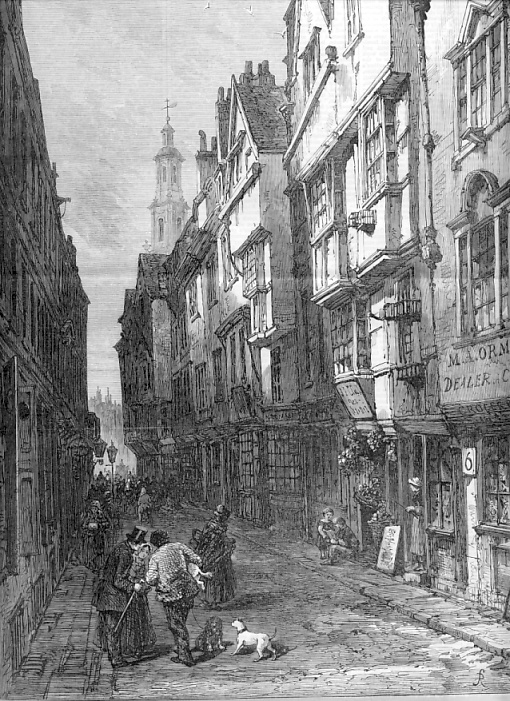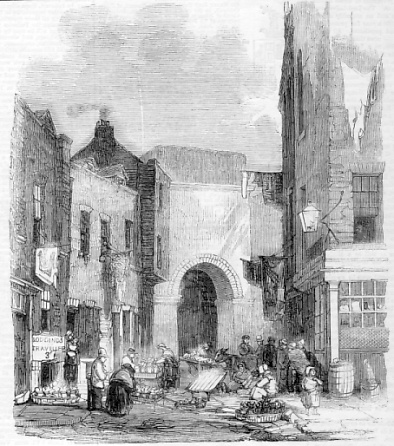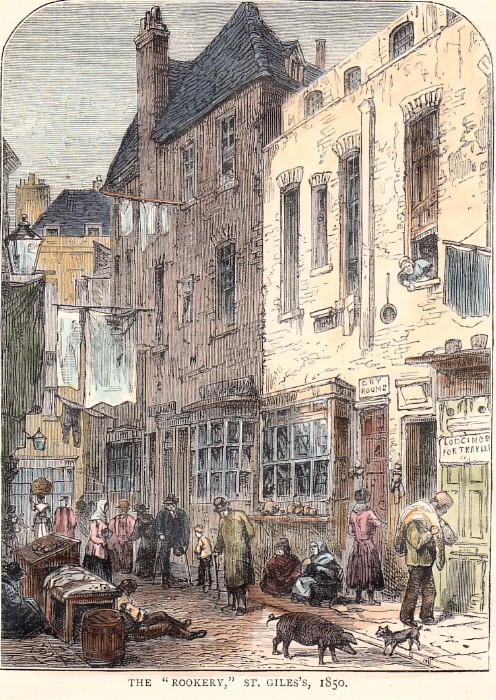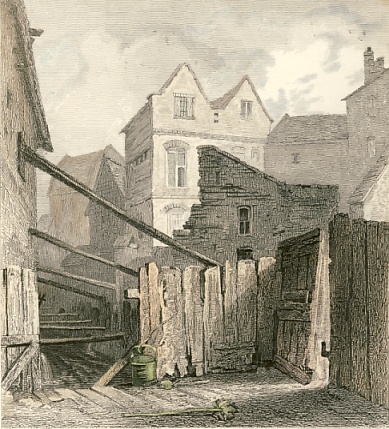|
This
district of Friars-mount, which is nominally represented by
Nichols-street, Old Nichols-street, and Half Nichols-street,
including, perhaps most obviously, the greater part of the vice and
debauchery of the district, and the limits of a single article would
be insufficient to give any detailed description of even a day's
visit. There is nothing picturesque in such misery; it is but one
painful and monotonous round of vice, filth, and poverty, huddled in
dark cellars, ruined garrets, bare and blackened rooms, teeming with
disease and death, and without the means, even if there were the
inclination, for the most ordinary observations of decency or
cleanliness. In the neighbourhoods where the inhabitants follow poor
trades the condition is but little better: a few streets where
there is a more cleanly appearance do but lead to a repetition of
the horrors just witnessed; and from garret to cellar whole
families occupy single rooms, or, if they can find a corner of
available space, take a lodger or two. In some wretched cul de
sac, partly inhabited by costers, the fetid yards are devoted to
the donkeys; while fish are cured and dried in places which cannot
be mentioned without loathing. Bandbox and Lucifer-box makers, cane
workers, clothes peg makers, shoemakers, and tailors, mostly earning
only just enough to keep them from absolute starvation, swarm from
roof to basement; and, as the owners of such houses have frequently
bought the leases cheaply and spend nothing for repairs, the profits
to the landlords are greater in proportion than those on a
middle-class dwelling.
The visitor who, after having threaded the labyrinth of
Friars-mount, remembers that it is principally to Thorold-square
that attention has been called, will wonder in what that place can
be worse than the neighbourhood he has just left. The truth is, that
it is in nothing worse—nay, is many degrees better, since it is
approached from the main road; but that such a den should for so
long have been suffered to open from a broad public thoroughfare is
in itself a pretty good evidence of what must be the condition of
the places which are hidden in almost unexplorable corners. Thorold-square is a repetition of these, but on a larger, lighter,
and airier scale. It is true that it is muddy, that its houses are
ruinous, and that the rotten, ruined, wooden pump, stuck full of
nails, which adorns its filthy area is a pretty good representative
of the usual water supply. It is equally true that on entering it
from the main street the visitor will feel a sickly feeling creep
over him, and would, if he were previously hungry, discover within
himself a sudden loathing for food and a desire for strong drink. But Thorold-square is by no means an unfavourable specimen of
Bethnal-green, although the parish authorities are making much of
it, as though for its condition alone they had been liable to
censure.
This impression is still further increased on reaching
Hollybush-place, where the poor shoemaker, who occupies a garret with
his family, has lost two children by disease which has been directly
attributed to the impure air. It is with reference to Hollybush-place
that the Inspector of Nuisances took exception to the inaccuracy of
a report which was current to the effect that a shed of sixty cows
was only nine feet from the house where the shoemaker's children
died of putrid fever, and that pigs were also kept close by. He
declares that there were but fifty cows, that the shed was some
eighteen feet from the house, and that pigs have not been kept there
lately. Taking this correction for what it is worth, the visitor
will have remarked on his journey several stifling localities where,
amongst the crowded hovels, pigs are very evidently kept, and add
their filthy exhalations, ay, and their special diseases, to the
general abominations. As there are also several cowsheds and not a
few slaughter-houses in this eastern portion of Bethnal-green,
which, in the district of Twig-folly and all that neighbourhood,
rivals Friars-mount itself, and has horrible peculiarities of its
own, it might be useful to inquire to what purpose the animals are
ultimately applied. There can be no necessity for stall-fed cows in
this particular district, since all the milk consumed (and there can
be but little in proportion to the number of inhabitants) might
readily be sent from the country by the Great Eastern Railway to
Mile-end station, and there delivered to the dealers.
It is scarcely too much to say that stall-fed
cows huddled together in filthy, undrained sheds, in the midst of fever-haunted houses,
must yield milk of a very inferior quality, but both cows and pigs
suggest a more startling consideration. It is the custom when cows
"go off their milk" to exchange them for others; but what of the
instances where cows either die or, being past yielding, are
slaughtered? What of the pigs, which poison if they are not
poisoned in return by the foulness of their habitations? It is a
significant fact, whether it has any relation to this inquiry or
not, that all through this teeming neighbourhood of Bethnal-green
the visitor will have noticed a surprising number of shops where the
coarsest parts of meat seem to share the space with what butchers
call offal. Cow-heels, bullocks'-hearts, kidneys, and livers, thin
and poor-looking tripe, and sheeps'-heads are amongst the uncooked
portion of the stock; while the cooked viands are represented by
piles and chains of bruised, and often damaged-looking, saveloys,
black-puddings, and a sort of greasy cakes of baked sausage-meat,
known as "faggots," sold for a penny or three farthings, and made of
the harslet and other internal portions of the pig. It is often the
case that these shops have some display of joints of meat, often
coarse, poor, and flabby-looking, but they bear no proportion to the
staple trade. It would be curious to inquire how many Bethnal-green
pigs, or if any Bethnal-green cows, ever find their way to a regular
dead-meat market, there to come under the observation of an
authorised inspector. Whether they do or not, the places in which
they live must be removed, land this foul district must be purged,
or our sanitary legislation is ineffectual, and all the wonderful
sanitary schemes of which we have heard, and for which we shall have
to pay so much, are but costly failures.
―――♦―――

Wych-Street.
The Illustrated London News, 1st
January, 1870.
―――♦―――

Water Tank in St. Giles-in-the-field
The Illustrated London News, 6th
November, 1858.
THE ILLUSTRATED LONDON NEWS
6th November, 1858.
―――♦―――
Water Tank in St. Giles-in-the-field.
THERE are certain
portions of London where the buildings are dilapidated and most of
the inhabitants squalid, in which at times such picturesque scenes
are found that an artist might employ the material with as much
effect as some of the sketches procured by long travel in foreign
cities. In such neighbourhoods as that shown in the Engraving,
which are occupied by numerous costermongers, in the spring and
summer, the narrow roading is gay with roses, geraniums,
musk-plants, wallflowers, fruit, vegetables, &c., in their season,
which are bought in large quantities from Covent Garden and other
markets, for the purpose of being trimmed up and arranged for
general sale.
In those back slums, hidden from the public view, market
bunches of flowers, watercresses, cabbages, turnips, &c., are
artfully divided into smaller parcels, and arranged with a degree of
taste which is in some cases remarkable. As well as variety of
taste, there are also evidences of different degrees of prosperity
amongst those itinerant dealers.
Reared, as most of this class have been, under very
unfortunate circumstances, we can scarcely be surprised at their
roughness of manner and other imperfections. It should,
however, be noticed that many of those men and women, by great
exertions from early morning till late at night, contrive to keep
from the prison and the workhouse; and it is difficult for those who
are differently situated to form an idea of the amount of firmness
which is required to preserve their limited capital, tempted as they
often are by much poverty and privation.

Generally speaking, the population of such neighbourhoods as
this are difficult to deal with in a sanitary point of view; and,
although in the Model Buildings in Portpool-lane a spacious
apartment at the basement of the premises was provided for the use
of costermongers, so that they might n separate compartments, at a
cost of from 2d. to 3d. a week, keep in safety and with the
advantage of good ventilation unsold fish and other perishable
matters, we believe that not a single offer was made to occupy this
place, although the evil of keeping donkeys, vegetables, and other
perishable goods in confined dwellings is evident. Owing to
this indifference it is necessary, for the benefit of those who are
either so destitute of knowledge or so young that they are not able
or likely to help themselves, that both persuasion and force should
be employed to remedy those ill conditions which amongst the poorer
classes of London society have caused so much remark and been
attended with such bad consequences.
The large tank in the background of the Engraving was erected
at a time when water in this dense population was almost as scarce
and precious as in the desert, and has proved a great benefit to the
neighbourhood.
On a recent occasion we made an examination of this district,
and found great improvement. In the lodging-houses the
sanitary police watch with care and much judgment the condition of
the drainage, water supply, number of beds in apartments, and the
cleanliness of the rooms; and now, instead of the general
reception-places for travellers being dark, dingy, and underground
dens, with the small windows and entrances closed by shutters and
other contrivances to hide the inmates from view, large spaces have
been opened and fitted with iron gratings, through which a
sufficient amount of fresh air is supplied. Convenient
fireplaces and water-boilers have been placed for cooking, &c. plate
racks and other conveniences have been provided, and the rooms
whitewashed and well lighted with gas. This beneficial change
has produced its certain results; and those who are obliged to
resort to these temporary homes can enjoy a certain amount of
comfort and sleep without danger to health; and, moreover, the light
and cleanliness induce care for personal appearance; and many, both
male and female, who would not in the dark dens have thought of it,
may now be seen mending their clothes, and washing both them and
their faces.
Such dwellings as those drawn will in a very short time cease
to exist in the metropolis, and we have therefore made this
pictorial record of them in our pages. They will be looked at
with curiosity then, when, although there is no hope that the "poor
will cease in the land," we trust that their condition will be much
bettered.
―――♦―――

Old houses with the open part of the Fleet Ditch,
near Field Lane.
From London, pub. D. Bogue, Fleet Street. |